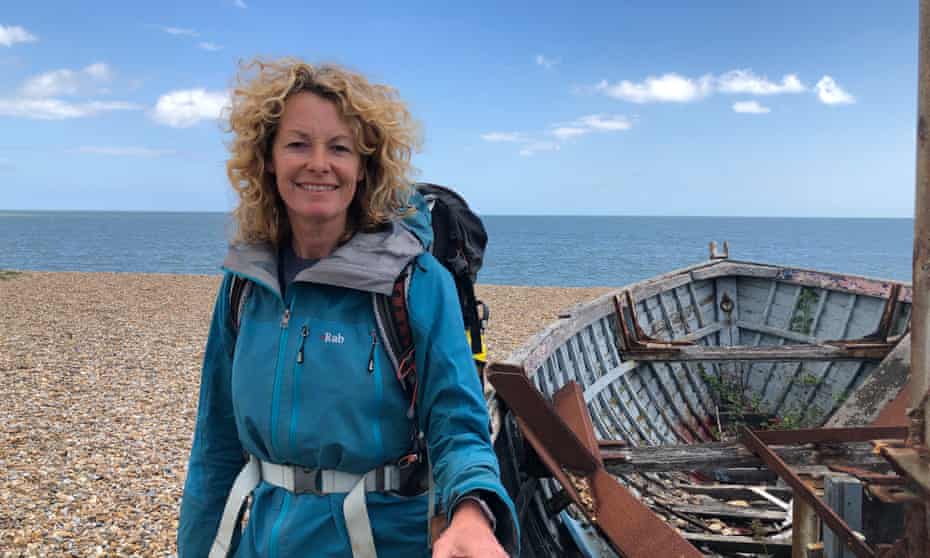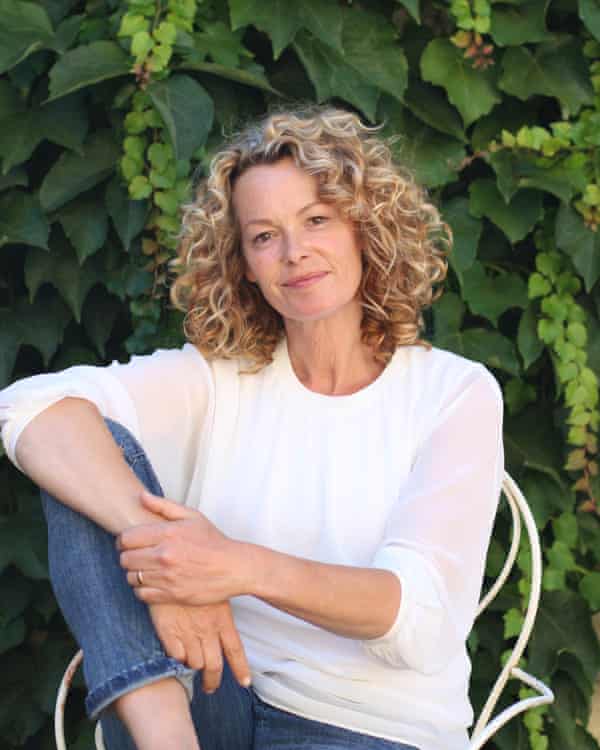It is a rare day that Kate Humble doesn’t get up and get outside, walking out from her farm in the Monmouthshire countryside. “I want to be outside for the first hour or two of the day: no phone, no distractions. I’m sure we all wake up with a million things going on in our heads, all these disjointed thoughts, worries and anxieties. For me, that part of the day, when all I have to think about is one foot going in front of the other and not falling over, creates a headspace that allows all my thoughts to settle in a way that feels much more manageable.”
Humble is a walker – she wrote a 2018 book on the subject, and is presenting a new TV series on it – but the last year has turned many of us into walkers, too. Whether for exercise, to break the monotony or to snatch the chance to walk and talk with a friend, for those of us lucky enough to be physically able and safe to venture beyond the front door, a stroll has become a highlight of the day. “We’re scrabbling to find positives of this situation, and I think one is that it has turned our focus back on to what’s on our doorsteps, whether it’s the wildlife in our gardens, or the beauty of our urban parks,” says Humble. As an ambassador for Living Streets, the charity that campaigns for a better walking environment in towns and cities, Humble hopes the pandemic may speed up the shift away from car-dominated urban spaces. With fewer cars on the road, “I think people have realised that walking is often quicker, healthier, just generally a nicer way of getting around.”
Will it last? Humble – energetic, her smiley, scrubbed face appearing on my laptop screen, with one of her dogs somewhere at her feet – is optimistic. After that first intense lockdown, “I might have said ‘no’ because I think [people felt] that it would all be over in a couple of months, then we’d go back to normal. I think now we’re realising that our lives have fundamentally changed. This lockdown does seem to be incredibly tough for a lot of people, and I think when they can get outside it is even more of a respite.” It’s also more of a deliberate decision, she adds, “because it’s tough when it’s freezing, or pissing with rain, but you still feel the need to get out of the four walls”. She thinks we will hold on to a newfound appreciation for walking “because it has been important for our sense of wellbeing more than ever”.
The links between walking and mental health are well established, and Humble knows that it helps her. “There is something about the rhythm of putting one foot in front of the other that does something really good to your brain.” A day that starts with a walk is for her, she says, “more manageable, [and I feel] that things are more achievable. Or if they’re not achievable, that it doesn’t matter – walking puts things into perspective. And if there are things that are worrying me, or I’m sad about …” Her voice breaks and she blinks back tears. Humble’s dog, whom she’d had for 13 years, recently died. “Walking really helps. You can walk along with snot everywhere and nobody cares because no one can see you. It’s very releasing, whether it’s the action of your feet or just being outside.”

She made her TV series, Kate Humble’s Coastal Britain, last summer, when restrictions were lifted. It’s a diverting, escapist series, especially for anyone facing the prospect – if we’re lucky – of a UK-based holiday this year. Humble admits to thinking it had been done too many times before, but even this seasoned walker discovered new (to her, at least) places. After one 11-mile walk in Exmoor, she finished at the dramatic Valley of Rocks, with its turrets and stacked slabs, as if assembled with a child’s building blocks. “I was just like: ‘This can’t be England. It’s just so exotic.’ I loved it.”
One downside to the mass discovery of the joy of walking is newly rubbish-strewn, bottlenecked paths. On her birthday, on an otherwise nondescript day in December, Humble’s treat was to hike in a local peak with her husband and one of the dogs. “The road was packed. We looked at the cars and just went: ‘We’ll go somewhere else.’ We went five miles down the road, looked at our OS map, found a route and did an amazing walk, and saw nobody. We are very lucky in this country – there is lots of space to walk, and you don’t have to go to the same place at the same time. That can be a problem in places like the popular routes in the Lake District and coastal paths – erosion, litter, overcrowding. I will always encourage people to walk, but don’t think that just because it hasn’t been written about, or been on the telly, that it’s not going to be good. It might be better.”
The same daily walk around your neighbourhood can be made more interesting and purposeful, she says, by taking a tip from the naturalist and writer Richard Fitter. “For the last 50 years of his life, he kept notebooks of all the little things that he noticed when he went out on his same daily walk – the first snowdrop, celandine or whatever it was. Whether you write it down or just take a mental note, I find it really uplifting that we may be living this weird and scrambled life, but nature is ticking along, doing her thing.”

Humble had an idyllic childhood in the Berkshire countryside, running around outside with her younger brother. “I went to A&E a lot because I fell out of trees. I spent every waking moment, when I wasn’t being forced into school uniform, mucking out things, climbing things, on my bike or building camps.” If you grew up in the 70s, she says (she is 52), “there was nothing else to do, and we didn’t really watch telly anyway. There was no such thing as anyone worrying about whether you were bored, or if you were bored, it was fine – boredom can be a really creative thing. I feel grateful for growing up then, not having screens and definitely not having social media. That you had to make your own fun, and a lot of that meant being outside.”
She wanted to be an actor but gave up after failing to get into the National Youth Theatre. She spent a couple of years travelling, then got a job as a runner in TV. She didn’t plan on becoming a presenter until her boss at the Holiday programme asked her to do a screen test. “I’d worked in telly for 10 years, so I knew the realities of being a presenter – it can be fantastic, but you have very little control over your career path,” she says.
Careers can seem short, and though Humble stresses it’s also true for men, she says, “for women, it can feel more brutal because there is this perceived wisdom that when we get to 40, nobody wants to look at us any more. I didn’t really give any thought as to how long my career may last, I had no grand plan.” That she has lasted – mostly in wildlife and rural shows – is partly, she thinks, because “I’ve never gone the glamour route, for very obvious reasons, and maybe that’s given me a longevity”.
It is a rare interview with Humble that doesn’t touch on why she never wanted to have children. When she started talking about it in her 40s she found “there were a lot of women who said: ‘We feel like this too; we’ve never felt the need to have children, but we feel this huge social pressure.’ I have been born and brought up in a family, a culture and a country that gives me that choice. That is the essence of liberation that, as a woman, I am allowed to make that choice. It doesn’t mean you’re selfish, you’re going to have an empty life or that you don’t get great joy out of other people’s kids, particularly when you can give them back.”
For some it is for environmental reasons or because the world seems to be in such a frightening state. This wasn’t Humble’s consideration at the time, but it makes sense to her. “We hope that we haven’t left everything so late, that our world is going to be able to sustain future generations in a way that is not fraught with war and destitution, and that as a society, we come out of this pandemic, being more caring, sensitive, more in tune with what needs to happen long-term.”
She laughs when people (regularly) suggest her dogs are a “child substitute”. “No, they’re dogs!” But she does, smiling broadly, say she feels “slightly” grandmotherly towards Dahlia, a pig, whom she bred, and who is about to have her first litter. Her farm, run by tenant farmers – though Humble is still hands-on – is bursting with life. There are goats due soon, and the sheep are lambing. Humble took the night shift last week and helped a ewe deliver a lamb that she thought had died. “I managed to get the lamb out, and it lived, and then its twin lived. It’s six in the morning, and you think: ‘I’ve saved two lives! I feel great.’”
Kate Humble’s Coastal Britain, Fridays, 8pm on Channel 5




